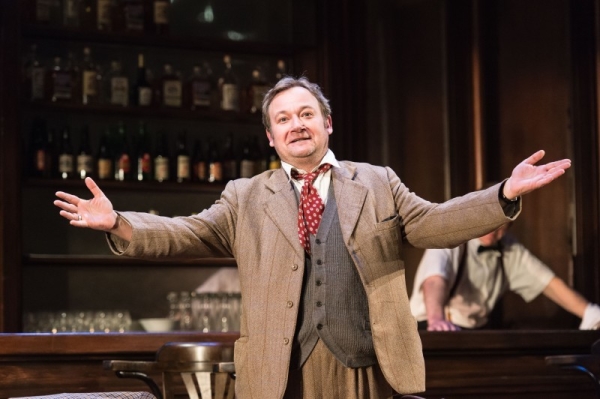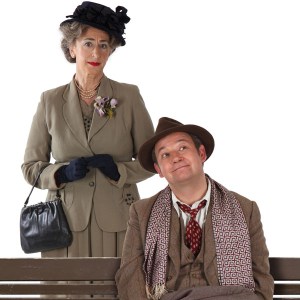Harvey (Theatre Royal, Haymarket)
James Dreyfus and Maureen Lipman star in this revival of Mary Chase’s 1944 play

© Manuel Harlan
Mary Chase’s 1944 Pulitzer prize-winning whimsical fantasy about a man with an invisible six-foot rabbit who may be a spectre of a better life or a spectator of a dull one is an old-fashioned stalwart of the American repertoire (along with Our Town and Arsenic and Old Lace).
There’s no update or startling make-over in Lindsay Posner‘s staging at the Haymarket (a Birmingham Rep touring production) and don’t expect anything contemporary in the play’s ideas about psychiatry, addiction, social decorum or even public morality.
But there is a fascinating dual not so much between Elwood P Dowd (delightful James Dreyfus in the James Stewart role) and his pooka phantom as between social realism and surreal comedy, with notable support performances from Desmond Barrit as an irate judge, David Bamber as a flabbergasted, finally lunatic, psychiatrist and Linal Haft as a cab driver whose cuckoo customers are fine when he brings them to the sanatorium but "perfectly normal bastards" on the journey home.
The play was first done in London after the war with Sid Field as Elwood. Since then, Stewart himself made a London debut in a sleepy revival in 1975 and, twenty years later, Gordon (‘Allo, ‘Allo!) Kaye played opposite Golden Girl Rue McClanaham as his sister Veta at the Shaftesbury; another twenty years on, Veta is now taken by Maureen Lipman at her most angular and resourceful, setting up the action of trying to "launch" her daughter Myrtle Mae (a deliberately lumpen Ingrid Oliver) while fending off Elwood’s return to upset her Wednesday afternoon forum.
Harvey’s rabbit is his licence to dream, his drinking partner, his constant companion, but the play takes off when the very unspooky pooka becomes "real," too, for other characters; first when Veta is mistakenly assumed to be the client when she takes Elwood to the "rest home" and then by the psychiatrist himself when he’s embroiled in a bar room farce with Elwood and the romantic junior doctors (an attractive pairing of Jack Hawkins and Sally Scott).
For that last scene, designer Peter Mackintosh has followed the movie and created the bar itself (not in the play) as a handsome addition to the Dowd family library and the sanatorium reception. It works very well. Dreyfus, too, flatters the play with his switched-off, slightly shabby, easy-going middle-aged dropout, executed with flashes of comic timing that are evidence of the real deal.
Authenticity elsewhere is harder to come by, and there’s a creeping sense of, yes, well, this is worth doing, but we’re not quite sure why. Chase is reputed to have written the play for a friend who lost her husband in the war, and you can see how – in a harsher version, perhaps – the play reflects a period of adjustment, and uncertainty, in the post-war years.
I’m glad to have seen it again, and you can’t discount the part it’s played in our transatlantic theatrical history. Best of all, it’s very good to see Dreyfus playing a role for which he’s ideally suited, surrounding this quaint but lovable eccentric with a nimbus of touching, ethereal complacency; and not even an admittedly over-the-hill Stewart did that.
Harvey runs at the Theatre Royal, Haymarket until 2 May. Click here for more information and to book tickets.













